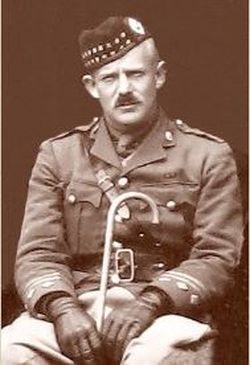
Gilbert Davison Pitt Eykyn was born at the France Lynch parsonage in Gloucestershire on the 22nd August 1881. He was baptised on the 29th September 1881. He was the only son of the late Reverend Pitt Eykyn. His father at the time of his death was Chaplain at Parel Bombay. Gilbert married Emily Constance on the 28th November 1902 and a son, Duncan Arthur, was born on the 11th August. The 1911 census shows that Duncan was born Poona in India. At some point after the family returned to England they moved to Northallerton in North Yorkshire.
Gilbert was a career soldier. He was also a gifted linguist, having passed Army exams in Russian, French and Hindustani. He received his first commission with the 3rd Loyal North Lancashire Regiment in 1899. He then joined the 4th Manchester Battalion in May 1901 and was promoted to Lieutenant on the 24th December 1901. He joined the Royal Scots on the 4th February 1905 attaining the rank of Captain on the 26th June 1913. On the 13th February 1913 he was appointed adjutant to the 4th Battalion Yorkshire Regiment in Northallerton. During his military career he had served in India and saw action in the 2nd Boer War (1899-1902).
Gilbert was with the 4th Battalion Yorkshire Regiment when they arrived in France just prior to the 2nd Ypres offensive. He was killed leading his men in the storming of St Julien on the 24th April 1915. He was 34 years old. Gilbert has no known grave and is commemorated on the Menin Gate.
In a letter to his wife his Colonel wrote: ‘You remember he trained the Battalion, and the General has personally thanked us for our behaviour at a critical moment. His is our credit.’
Explore more memories from the ribbon
-
William Rutley
William was the son of William and Mary Rutley of 8 Mabal Street, Middlesbrough. He enlisted in late 1914 and was posted to the 8th Battalion of the Yorkshire Regiment. The 8th Battalion left for France in late August 1915 and occupied trenches in the La Rolanderie and Bois-Greniers districts throughout October, November and December. William is reported to have died of wounds on December 16th. He was 22 years of age. He was awarded the 1915 Star, the British War Medal and the Victory Medal. He was buried at Sailly-sur-la Lys Canadian Cemetery, Pas-de-Calais.
-
Ernest Wyatt Burnett
Gerald Burnett visited the museum to relate the story of his grandfather Ernest Wyatt Burnett. My Grandfather, Ernest Wyatt Burnett was born in Chudleigh, Devonshire, in 1886. After minimal schooling and several agricultural jobs, Ernest moved to London and became a chauffeur with various employers including Thomas Tilling. He spent the pre-war years driving around Great Britain with American tourists and contemporary industrialists such as Tommy Lipton of tea fame. Ernest enlisted with the Royal Army Service Corps, Mechanical Transport Branch, in April 1915 and became a Staff Car driver. In 1915, the Government appointed five official Western Front War Correspondents, Philip Gibbs, Percival Phillips, H. Perry Robinson, W. Beach Thomas and Herbert Russell. Ernest was assigned to be their driver, a position he held until the end of the war. Ernest was transferred to the Reserve in February 1919. Alongside his ‘Pip, Squeak and Wilfred’ decorations he was awarded a Silver Medal for Merit by Nicholas I, King of Montenegro. During WW2, Ernest served with the Home Guard at Balcombe Place, his Sussex home, where he was chauffeur to Lady Gertrude Denman who was President of the Women’s Institute and Honorary Director of The Women’s Land Army. My Grandfather was one of the lucky ones. He served his country, survived two World Wars, and lived a full and interesting life.
-
Thomas Cole
Submitted by Olivia Wallis of Richmond. Thomas Cole, son of Ben and Jane Cole, was born in Gainford, Durham in 1882, though the farming family resided in the local village of Newsham. On 9th June 1906, Thomas married Margaret Ellen Watson in St Cuthbert’s Church, Durham and, by 1911, Thomas and Margaret were the parents of Thomas, aged 3, Mary, aged 2, and Ben, aged only 11 months. Following the outbreak of war, though the exact date uncertain, Thomas enlisted at the neighbouring village of Dalton, and joined the 9th Battalion of the Yorkshire Regiment. Throughout his time with the 9th Battalion, Thomas wrote often to his devoted wife and children. In October 1916, Thomas wrote to tell his wife that he had become teetotal, news he expected to surprise his wife, explaining ‘I can’t drink French beer!’ Perhaps more poignantly, Thomas also expressed to Margaret his hopes of the future and a hope that future generations would never suffer the horrors of war. Thomas never got to pursue his hopes, he was killed on 23rd June 1917, aged 35. The battalion war diary for 23rd June does not detail events of that day, it simply collates casualties for the month as 6 men killed, 1 wounded and 2 missing. Private Thomas Cole is buried at Dickebusch New Military Cemetery, Belgium and commemorated locally on the war memorial in Newsham village.
